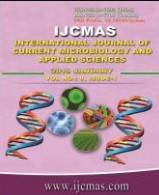


 National Academy of Agricultural Sciences (NAAS)
National Academy of Agricultural Sciences (NAAS)

|
PRINT ISSN : 2319-7692
Online ISSN : 2319-7706 Issues : 12 per year Publisher : Excellent Publishers Email : editorijcmas@gmail.com / submit@ijcmas.com Editor-in-chief: Dr.M.Prakash Index Copernicus ICV 2018: 95.39 NAAS RATING 2020: 5.38 |
Climate change influences composite set of measurable physical, chemical and biological soil properties attributes which relate to functional soil processes. Climate change impacts soil chemical, physical and biological functions through a range of predicted global change drivers such as rising atmospheric carbon dioxide (CO2) levels, elevated temperature, altered precipitation (rainfall) and atmospheric nitrogen (N) deposition (French et al., 2009). The exact direction and magnitude of these impacts will be dependent on the amount of change in atmospheric gases, temperature, and precipitation amounts and patterns. Many studies have progressed our understanding of relationships between particular soil properties and climate change drivers, e.g. responses to temperature, CO2 or rainfall. The complexity and interdependence of many of the climate change drivers influence soil microbial properties like microbial biomass and biomass diversity, rate of organic matter decomposition, C and N cycles, chemical properties of soil like pH, EC, nutrient availability and physical properties like porosity, aggregate stability, soil erosion, etc.
 |
 |
 |
 |
 |